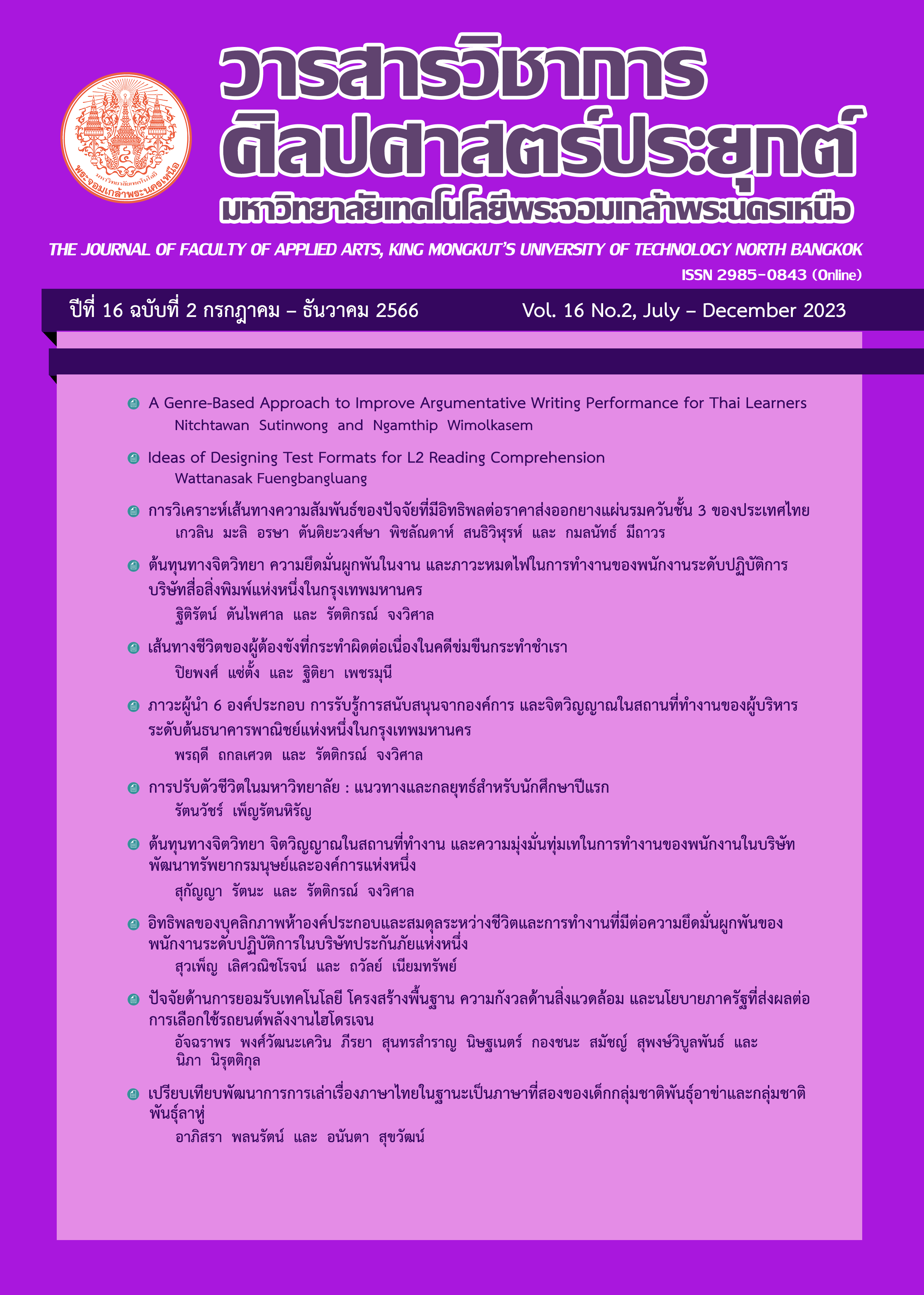ต้นทุนทางจิตวิทยา จิตวิญญาณในสถานที่ทำงาน และความมุ่งมั่นทุ่มเทในการทำงาน ของพนักงานในบริษัทพัฒนาทรัพยากรมนุษย์และองค์การแห่งหนึ่ง
Main Article Content
บทคัดย่อ
การศึกษาครั้งนี้มีวัตถุประสงค์เพื่อศึกษา 1) ระดับต้นทุนทางจิตวิทยา จิตวิญญาณในสถานที่ทำงาน และความมุ่งมั่นทุ่มเทในการทำงานของพนักงานในบริษัทพัฒนาทรัพยากรมนุษย์และองค์การแห่งหนึ่ง 2) ความสัมพันธ์ระหว่างต้นทุนทางจิตวิทยาและจิตวิญญาณในสถานที่ทำงาน กับความมุ่งมั่นทุ่มเทในการทำงานของพนักงานในบริษัทพัฒนาทรัพยากรมนุษย์และองค์การแห่งหนึ่ง 3) ตัวพยากรณ์ร่วมระหว่างต้นทุนทางจิตวิทยาและจิตวิญญาณในสถานที่ทำงานที่สามารถทำนายความมุ่งมั่นทุ่มเทในการทำงานของพนักงานในบริษัทพัฒนาทรัพยากรมนุษย์และองค์การแห่งหนึ่ง กลุ่มตัวอย่าง คือ พนักงานในบริษัทพัฒนาทรัพยากรมนุษย์และองค์การแห่งหนึ่ง จำนวน 117 คน เครื่องมือที่ใช้ในการเก็บข้อมูล คือ แบบสอบถามข้อมูลส่วนบุคคล แบบวัดต้นทุนทางจิตวิทยา แบบวัดจิตวิญญาณในสถานที่ทำงาน และแบบวัดความมุ่งมั่นทุ่มเทในการทำงาน สถิติที่ใช้ในการวิเคราะห์ข้อมูล ได้แก่ ค่าร้อยละ ค่าเฉลี่ย ส่วนเบี่ยงเบนมาตรฐาน ค่าสัมประสิทธิ์สหสัมพันธ์ของเพียร์สัน และการวิเคราะห์การถดถอยพหุแบบนำตัวแปรเข้าทั้งหมด ผลการศึกษาพบว่า 1) พนักงานในบริษัทพัฒนาทรัพยากรมนุษย์และองค์การแห่งหนึ่งมีต้นทุนทางจิตวิทยา จิตวิญญาณในสถานที่ทำงาน และความมุ่งมั่นทุ่มเทในการทำงานอยู่ในระดับสูง 2) ต้นทุนทางจิตวิทยาและจิตวิญญาณในสถานที่ทำงานมีความสัมพันธ์ทางบวกกับความมุ่งมั่นทุ่มเทในการทำงานของพนักงานในบริษัทพัฒนาทรัพยากรมนุษย์และองค์การแห่งหนึ่งอย่างมีนัยสำคัญทางสถิติที่ระดับ .01 (r =.577 และ .705 ตามลำดับ) 3) ต้นทุนทางจิตวิทยาและจิตวิญญาณในสถานที่ทำงานสามารถร่วมกันพยากรณ์ความมุ่งมั่นทุ่มเทในการทำงานของพนักงานในบริษัทพัฒนาทรัพยากรมนุษย์และองค์การแห่งหนึ่งได้ร้อยละ 57.9 อย่างมีนัยสำคัญทางสถิติที่ระดับ .001
Article Details

อนุญาตภายใต้เงื่อนไข Creative Commons Attribution-NonCommercial-NoDerivatives 4.0 International License.
1.บทความที่ตีพิมพ์เป็นลิขสิทธิ์ของวารสารวิชาการศิลปศาสตร์ประยุกต์ การนำเนื้อหา ข้อความหรือข้อคิดเห็น รูปภาพ ตาราง ของบทความไปจัดพิมพ์เผยแพร่ในรูปแบบ ต่าง ๆ เพื่อใช้ประโยชน์ในเชิงพาณิชย์ ต้องได้รับอนุญาตจากกองบรรณาธิการวารสารอย่างเป็นลายลักษณ์อักษร
2.ข้อความที่ปรากฏในบทความแต่ละเรื่อง เป็นความคิดเห็นส่วนตัวของผู้เขียนแต่ละท่านไม่เกี่ยวข้องกับวารสารวิชาการศิลปศาสตร์ประยุกต์ และบุคลากร คณาจารย์ท่านอื่น ๆ ในวารสารฯ แต่อย่างใด ความรับผิดชอบองค์ประกอบทั้งหมดของบทความแต่ละเรื่องเป็นของผู้เขียนแต่ละท่าน หากมีความผิดพลาดใด ๆ ผู้เขียนแต่ละท่านจะรับผิดชอบบทความของตนเองแต่ผู้เดียว
เอกสารอ้างอิง
ภาษาไทย
ชนกาญจน์ พันธุ์เดิมวงศ์. (2558). จิตวิญญาณในการทำงาน : มิติใหม่ในการบริหารทรัพยากรมนุษย์. การจัดการสมัยใหม่,
(2), 1-10.
ตรีทิพย์ ขันตี และวาสิตา บุญสาธร. (2562). ปัจจัยที่ทำให้เกิดความมุ่งมั่นและพลังขับเคลื่อนในการทำงานเป็นวิทยากร
ระดับภูมิภาคเอเชีย-แปซิฟิก กรณีศึกษาบริษัทข้ามชาติแห่งหนึ่ง. วารสารสังคมศาสตร์และมนุษยศาสตร์, 45(1),
-199.
บริษัทพัฒนาทรัพยากรมนุษย์และองค์การแห่งหนึ่ง. (2562). เอกสารประชาสัมพันธ์บริษัทครบรอบ 72 ปี [สูจิบัตร].
กรุงเทพมหานคร : บริษัทพัฒนาทรัพยากรมนุษย์และองค์การแห่งหนึ่ง.
พวงรัตน์ ทวีรัตน์. (2540). วิธีวิจัยทางพฤติกรรมศาสตร์และสังคมศาสตร์. (พิมพ์ครั้งที่ 7). กรุงเทพมหานคร : มหาวิทยาลัย
ศรีนครินทรวิโรฒ ประสานมิตร.
ภคภัค สังขะสุนทร และวาสิตา บุญสาธร. (2558). ปัจจัยที่ทำให้เกิดความมุ่งมั่นและพลังขับเคลื่อนในวิชาชีพบุคคล :
กรณีศึกษา บริษัท ปูนซีเมนต์ไทย จำกัด (มหาชน). HROD Journal, 7(2), 43-69.
รัตติกรณ์ จงวิศาล. (2558). อิทธิพลของจิตวิญญาณในสถานที่ทำงาน สุขภาวะทางจิตวิญญาณ และภาวะผู้นำที่มีต่อผลลัพธ์
ขององค์การ. วารสารวิทยาสารเกษตรศาสตร์ สาขาสังคมศาสตร์, 38(2), 644-654.
. (2564). จิตวิทยาองค์การ. (พิมพ์ครั้งที่ 5). กรุงเทพมหานคร : เอเชีย ดิจิตอลการพิมพ์.
สำนักงานเลขาธิการสภาผู้แทนราษฎร. (2565). มาตรการปิดเมือง (Lockdown) กับการควบคุมโรคโควิด 19 ในประเทศไทย.
เข้าถึงได้จาก https://library.parliament.go.th/th/radioscript-rr2565-jan3
ภาษาอังกฤษ
Cavus, M. F. & Gokcen, A. (2015). Psychological capital : Definition, components and effects. British Journal
of Education, Society & Behavioral Science, 5(3), 244-255.
El-Nawajha, Z. (2022). Workplace spirituality and its relationship to the two types of job passion among
the basic stage teachers. Palestine Technical University Research Journal, 10(1), 77-92.
Field, A. (2009). Discovering statistics using SPSS. (3rd ed.). London, United Kingdom : SAGE.
Gómez-Salgado, J., Navarro-Abal, Y., López-López, M. J., Romero-Martin, M. & Climent-Rodriguez, J. A. (2019).
Engagement, passion and meaning of work as modulating variables in nursing : A theoretical analysis.
International Journal of Environmental Research and Public Health, 16(1), 108.
Granado, T. B. (2018). The Relationship between spirituality in the workplace and work intentions
(Doctoral thesis, Grand Canyon University, The United States of America). Retrieved from
https://www.proquest.com/docview/2071416621
Johri, R. & Misra, R. K. (2014). Self-efficacy, work passion and wellbeing: A theoretical framework.
The IUP Journal of Soft Skills, 8(4), 20-35.
Luthans, F. & Youssef, C. M. (2017). Psychological capital : An evidence-based positive approach.
Annual Review of Organizational Psychology and Organizational Behavior, 4(1), 1-43.
Luthans, F., Luthans, K. Y. & Luthans, B. C. (2004). Positive psychological capital : Beyond human and
social capital. Business Horizons, 47(1), 45-50.
Luthans, F., Youssef, C. M. & Avolio, B. J. (2007). Psychological capital : Developing the human
competitive edge. New York, NY: Oxford University Press.
Mello, J. A. (2019). Strategic human resource management. (5th ed.). Singapore : Cengage Learning Asia,
Pte Ltd.
Milliman, J., Ferguson, J., Trickett, D. & Condemi, B. (1999). Spirit and community at southwest airlines :
An investigation of a spiritual values-based model. Journal of Organizational Change Management,
(3), 221-233.
Said Taha, N. F. (2019). The prediction with work passion (harmonious and obsessive) according to
occupational resilience components for kindergarten teachers. Egyptian Journals, 14(2), 1-41.
Soder, P. F. (2016). Workplace spirituality and employee work intentions : Examining the relationship
and the mediating role of ethical leadership. (Doctoral thesis, University of Louisville, The United
States of America). Retrieved from https://doi.org/10.18297/etd/2569
Vallerand, R. J. & Houlfort, N. (2019). On passion for work : A brief history and an introduction. In R. J.
Vallerand & N. Houlfort (Eds.), Passion for Work : Theory, Reseach, and Applications (pp. 3-14).
New York, NY: Oxford University Press.
Zhang, S., Ge, S., Tian, J., Li, Q., Wang, M., Wang, X., Zhang, M., Zhoa, J., Yang, L., Cao, D. & Sun, T. (2022).
A cross-sectional study of individual learning passion in medical education : Understanding self-
development in positive psychology. Frontiers in Psychology, 13, 1-11.
Zigarmi, D. & Nimon, K. (2011). A cognitive approach to work intention : The stuff that employee work
passion is made of?. Advances in Developing Human Resources, 13(4), 447-461.
Zigarmi, D., Houson, D. & Witt, D. (2009). Employee passion. Retrieved from The Ken Blanchard
Companies website: https://www.kenblanchard.com
Zigarmi, D., Houson, D., Witt, D. & Diehl, J. (2013). Employee work passion: Connecting the dots.
Retrieved from https://resources.kenblanchard.com/whitepapers/employee-work-passion-volume-
-connecting-the-dots


